Alicia Butcher Ehrhardt's Blog
May 6, 2025
Members of the Reading Jury: What say ye?
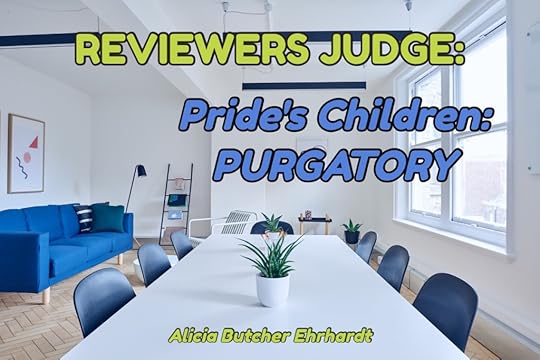 OTHER READERS WANT TO KNOW WHAT YOU THINK
OTHER READERS WANT TO KNOW WHAT YOU THINKIn my post on my writing blog, liebjabberings, about a legitimate use of AI for writers, I discussed using the AI tools to do the repetitious, most boring writing job of summarizing REVIEWS left by lovely readers, in some form a potential new reader can absorb quickly (or decide to skip the book because of), a job which would take the writer a fair amount of time that could be spent otherwise.
Amazon has provided this neat tool free of charge.
It’s for their readers, but there’s no reason we writers can’t use it to present the case efficiently for our own books. And the links to the actual reviews seem to have remained viable.
PLEASE EXCUSE the somewhat odd presentation; the text I copied from PURGATORY’s page came with so many embedded formatting codes I could barely get it legible!
Scroll down on the book’s page to the CUSTOMER REVIEWS sectionThis is below any Editorial Reviews earned or purchased for the book by the publisher or the writer.
It is carefully labeled by Amazon as AI. IT ISN’T PERFECT. But I didn’t have to dig through the reviews, summarize, and tabulate – and potential readers should get a laugh and an idea if they will like Pride’s Children: PURGATORY.
—Customers say:
—Customers find this novel fascinating, with intricately developed characters and rich, nuanced writing that’s literary without being pretentious. Moreover, the book’s historical information is well-presented, and customers appreciate its beautiful art and leisurely pace.
—AI-generated from the text of customer reviews
The options provided for PURGATORY are:——Story quality:16 customers mention “Story quality”; 16 positive 0 negative
Customers enjoy the story of this novel, describing it as a fascinating narrative that takes readers on a journey into heart and soul.
“…The character development, historical references, romance and action mixed with bits of Irish, Spanish, CFS and religion made the book quite…” Read more
“…all the best with her writing—it is clear all through that it is a labor of love, and that she brings to it deep talent and a delicate touch.” Read more
“…Elegant literary fiction which is also literate, modern, gripping, and extraordinarily entertaining, to label the subject matter a ‘love triangle’…” Read more
“…The narrative and dialogue were well written and nicely edited, which should be something readers can take for granted but isn’t always so….” Read more
——-Character development:
12 customers mention “Character development”, 12 positive 0 negative
Customers appreciate the intricate character development in the book, with one review highlighting the strong intellectual woman protagonist.
“…The character development, historical references, romance and action mixed with bits of Irish, Spanish, CFS and religion made the book quite…” Read more
“…Just as Sayers has a strong intellectual woman and an appealing male character, so Ehrhardt has the physician-mom-turned-disabled-bestselling-…” Read more
“…The plot is more than character-driven; there is a sense in which the plot is the characters….” Read more
“…or not: It’s immersion in other lives, other personalities, other realities….” Read more
——-Writing quality:
12 customers mention “Writing quality”; 12 positive 0 negative
Customers praise the writing quality of the book, describing it as rich, nuanced, and literary without being pretentious.
“…The thoughtful quotes at the beginning of each chapter added yet another dimension….” Read more
“…Those pages revel in exquisite personal detail, carefully shown in subtle words and thoughtsthat reveal decades of suffering and conflict, deep…” Read more
“…Elegant literary fiction which is also literate, modern, gripping, and extraordinarily entertaining, to label the subject matter a ‘love triangle’…” Read more
“…The narrative and dialogue were well written and nicely edited, which should be something readers can take for granted but isn’t always so….” Read more
——-Art:
[This one is a little odd, as I don’t think the reviewers are talking about drawings or paintings, but the AI refers to it as if it were; let’s give it artistic quality, and remember it doesn’t know what it’s talking about.]
5 customers mention “Art”; 5 positive 0 negative
Customers appreciate the artwork in the book, with one noting its intricate yet graceful style and another highlighting its rich landscapes.
“…Those pages revel in exquisite personal detail, carefully shown in subtle words and thoughts that reveal decades of suffering and conflict, deep…” Read more
“…gift–a literary novel replete with fully developed characters, rich landscapes, insightful journeys into conscience, morality, and ethics….” Read more
“The writing in Pride’s Children, Purgatory is beautiful – literary without being at all pretentious – but if you’re anything like me, it’s the…” Read more
“…I like the way the story unfolds, intricate yet graceful, with bends and twists that kept my interest throughout….” Read more
——Historical content:
[Note that the third review is misquoted by the AI. Oh, well. The references are to the historical setting of some of the MOVIES included in the story. The story is set in 2005/2006, which will be ‘historical’ soon enough.]
4 customers mention “Historical content”; 4 positive 0 negative
Customers appreciate the historical content of the book, finding the information interesting and well-presented, with one customer noting its exhaustive research.
“…The character development, historical references, romance and action mixed with bits of Irish, Spanish, CFS and religion made the book quite…” Read more
“…founded upon either the author’s own experience or diligent, exhaustive research. ((I can’t tell which. Ha!))…” Read more
“…No matter how interesting the historical information was presented, it was still a break from the main story and felt abrupt….” Read more
“…It includes history, art, family relations, love, nature and more. I recommend it for everyone….” Read more
——Interest:
3 customers mention “Interest”; 3 positive 0 negative
Customers find the book engaging, with one mentioning it kept their interest throughout and another describing it as fascinating.
“…mixed with bits of Irish, Spanish, CFS and religion made the book quite fascinating….” Read more
“…unfolds, intricate yet graceful, with bends and twists that kept my interest throughout….” Read more
“A wonderfully written story of love and obsession….” Read more
——-Pace:
3 customers mention “Pace”; 3 positive 0 negative
Customers appreciate the leisurely pace of the book.
“…She is glacially patient….” Read more
“…The pace is unhurried, almost meditative at times….” Read more
“…The pace is leisurely, like an afternoon tea in an English garden….” Read more
**********
Summary Judgement: Your Verdict?It’s useful, workable, awkward, wrong or misnuanced in places, and usable.
It took me long enough to clean up the text, but on the book’s Amazon page, it is easy to use.
I think it will provide enough information – and some overload – for most readers.
REMEMBER: you have to go to Pride’s Children: PURGATORY to do this yourself.
Or just use the summary above.
**********
March 13, 2024
Don’t fear reading an unfinished overarching story
 DOES THE STORY HAVE TO BE FINISHED BEFORE YOU START READING?
DOES THE STORY HAVE TO BE FINISHED BEFORE YOU START READING?The story you’re considering reading may not end with the current book. Is that reason not to start it?
Not if the JOURNEY is as good as the DESTINATION.
Dorothy L. Sayers is my mentor here. In Strong Poison, her jaded detective, Lord Peter Wimsey, falls hard for the woman in the dock at the Old Bailey, Harriet Vane, accused of poisoning her lover.
It took THREE more novels, with TWO irrelevant ones mixed in, before Peter and Harriet finally find peace in each other.
Each of those novels added to and changed the direction of the developing story between Peter and Harriet, taking the time to turn it into a friendship (originally, he led to her being exonerated in Strong Poison).
Sayers showedthat there was too much of a change needed to make her protagonists a couple, given where they started:
an age difference (he’s middle-aged, she’s in her 30s – they will have children before Sayers stops writing about them)a social class difference (she’s the daughter of a country doctor, he’s the younger brother of a duke)a status difference (he solves mysteries and crimes as a hobby, she’s a self-supporting writer)a financial difference (he travels, works with the Foreign Office; she writes potboilers for eating money)and a commonality: they’ve both gone to Oxford and read something significant (scholarship), but of course he has a huge experience database, and she doesn’t.
The RELATIONSHIP, to be believable,needs time to develop and mature (and Sayers walks us through it very believably) before their initial status (he saves her from the gallows, she responds to his offer of marriage by saying she will live with him if he wants, but not marry him) can get to the place where he develops a true respect and affection for the object of his very odd obsession.
Peter’s intentions are good, his timing terrible.
Harriet can’t handle the pressure but never takes the step of making her wish to turn him down stick permanently. And eventually realizes what has been going on, and that she’s changed as well.
The lightness of Sayers’ touch with her material, and how it goes, was far more interesting to me than the detective/mystery stories that drew me to this English series in the beginning (I read more of these than I can shake a stick at over YEARS – it was, with SF, my preferred reading material for a long time), but it took me a while to see why: Sayers sets up a relationship that is WORTH the BUILDUP.
No unbelievable leaps.
No falling for the rescuer.
No quick overcoming of obstacles.
No unsubstantiated major personality changes.
No gods in the machine or strokes of Fate.
Sayers both took her time,and gave her odd couple plenty of it, to get down to the bedrock of the question: are these two suited for each other and a long-term relationship – even though practically every other character, commenting on events as they happen, doesn’t see it.
I wish she’d chosen to do more with it after the marriage. There are only two short stories, and they are both lovely, only the later one, Talboys, showing what the author had wrought from her materials in their little family, with only the notation that Harriet still writes, and a very minor bit of detecting from Peter. Then she went on, having left her favored couple together and contented, to write theology!
Sayers taught me a lot about choosing your material and letting it mature. I am forever grateful.
I’m doing my own version.It’s called Pride’s Children. And will be about as long as GWTW when I’m finished. But it’s taking me time to do it right. And it’s coming out in pieces.
Several of my reviewers have caught on. I think they like it.
The point I’m trying to make is that I didn’t know, when I started reading the mysteries, that it would lead anywhere, but found, after it did, that I like Dorothy L. Sayers way of making it happen. I see her writerly fingerprints all over it.
With respect.
**********
January 3, 2024
Fewer but better the result of fear?
 IN THE WRITER/READER DANCE, WHAT DOES THE WRITER LEARN?
IN THE WRITER/READER DANCE, WHAT DOES THE WRITER LEARN?PURGATORY has 56 reviews on Amazon with a 4.3* average, and this hasn’t changed for a while.
NETHERWORLD, however, has only 9 reviews on Amazon, but with a 5* average.
It hasn’t been for lack of trying to get more people to read and review, but it puzzles me a bit.
I think NETHERWORLD is better than PURGATORY, in the sense that the first book in a trilogy is (and has to be) a bit of a set-up book, because no one comes in knowing the characters or the locations, and some of the writer’s ‘space’ has to be taken up with defining the universe of the story, making it real in a reader’s mind, and setting up the rules for interaction (how much from the author, vs. how much the reader is expected to contribute from the huge database stored in their head?), rules for grammar and italics and epigraphs and the whole tone.
I deliberately did NOT provide any way to catch up if you started with NETHERWORLD – no clever ways of a narrator reminding readers who a character is, or that we’ve been at this place before and should remember at least the basics about it.
Not because I assumed they would start with PURGATORY, although that works.
But mostly because there is so little space in a packed story for those extras – and I didn’t think I’d NEED to do it, not with my kind of readers, my kind of story.
I was a bit disappointed when a new reader had plans to START with NETHERWORLD, and was going to tell me how that experience went (not an uncommon procedure in the writing world), but she then never really got going for very good reasons having nothing to do with me or my writing, so I never got that piece of natural feedback I had hoped for.
I’m still hoping someone will.
But this FEAR you speak of – what’s that?That’s where I’m in uncharted territory, and have only my own experience to go by.
I remember, as a kid, reading books I didn’t want to share. As long as no one else knew about the book (I was a kid – probably more naive than most), it was mine. No one else had walked across the pristine snow in clunky boots. No one else knew the characters I had fallen in love with. I didn’t have to talk about it – only remember, and reread, and reposition myself into the milieu, the story, the life of the character I’d identified with.
I’ve probably mentioned my rule before: I have to be able to identify, in books and movies and stories, with at least ONE character – and if I can’t find even one sympathetic character to pretend to be, why would I bother to live that life?
So I was Pip, not Estella, in Great Expectations.
That’s more articulate than I had as a child – but even then I knew I was living a different life than the boring one I had every day.
I didn’t want to lose the book. I didn’t want it to have ended. I didn’t want to have to go back to real life.
I fought (quietly, in my mind) to stay.
The MORE I liked something, the LESS likely I was to share anything about it.
I didn’t go around proclaiming loudly that I had found something great and everyone should read it.
The book blogger who shares and analyzes and comments and judges? Anathema.
Does this apply to reviewing a book I really like?Dunno.
I review very few books.
Reviewing a book is pulling yourself out of it and trying to analyze it – and I don’t want to do that if I like it.
I don’t want to know that hordes of people like the same book I do – they can like what they like, but I don’t necessarily want to know about it, unless it emerges in a small conversation such as those that happen on blog posts you like enough to comment on at length.
All of this attitude is counterproductive for authors needing reviewsFor writers wanting to know if they’ve hit the mark.
For target audiences.
They say you shouldn’t read your reviews.
Excuse me?
I can understand not wanting to read what the people who call your baby ugly say, specifically. But the ones who get it? Those have stuck.
Praise is healing.
The biggest compliment you can get as a writer is a reader who struggles with offering praise – because you’ve unnerved them and broken through their defenses.
Which is why I like to find readers and bloggers and reviewers who DO write about what they like (extroverts?), share it, and hope other people will like the book, too. And ask them specifically. And then hold myself quiet and steady when those good reviews come in. (And ignore the others.)
I didn’t expect this reaction from myselfBut I wonder if I’ve elicited it from others.
And the fear would make sense: leaving a public written review where other people can read it is admitting you have been to that book, and have not wanted to come back.
Maybe it’s just an introvert thing.
But it would explain something that ALSO puzzles me: emails giving me that first reaction that tells me I got through to someone – and the promised review never showing up.
I’m afraid I would have done the same.
Or maybe it just didn’t hit as hard as I’m assuming…
**********
October 7, 2023
How to get PG-13 Pride’s Children banned
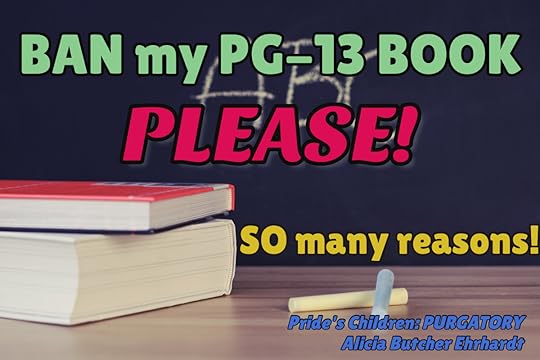 IS ALL PUBLICITY GOOD PUBLICITY?
IS ALL PUBLICITY GOOD PUBLICITY?This is my last chance this year for this post: Banned Books Week is Oct. 1-7 in 2023.
There are a million things to post about and comment about and write articles about on the topic of BANNED BOOKS. And most of them have been done ad infinitum.
What I hadn’t seen a lot of was commentary about the good effects of having a book banned somewhere, and that is the extensive and FREE publicity that leads, every year, to these books being given a kick in the name-recognition department. Which results in SALES!
People who read about Holden Caulfield when they were in high school may go drag it out and make it available to their own teens, even though it is old, well, just because. Because it being banned in some Texas small town somehow makes it more important.
It’s the PRINCIPLE of the thing!
I’m adding this post to the tail-end of the yearly frenzyBecause it might backfire. Publicity can do that. And I’m aware of the fragility of the civility of the mob.
While hoping, in some small way, to cash in on it!
We obscure writers will do (almost) anything to abandon obscurity.
The meat of the postTHERE ARE GOOD REASONS TO BAN PRIDE’S CHILDREN: PURGATORY AND PRIDE’S CHILDREN: NETHERWORLD.
AND THERE WILL BE GOOD REASONS TO BAN PRIDE’S CHILDREN: LIMBO WHEN I FINISH WRITING THE WIGGLY THING.
I loved Jane Eyre when I was a teen – but some things slipped past me in the heat of the story that I didn’t understand until years later.
As an adult, I’ve always assumed that writing PG-13 was EXACTLY that, expressing adult ideas in such away that those who were adults and informed about such matters as sex would understand that, and that the teens who were attracted to the story of the governess who eventually married the Lord of the Manor but had to go through a few bumps first would be able to not notice some of the themes that were being discussed:
Child abuse – by relatives and authorities
The problems with inheritance laws
Society’s disapproval of a man traveling with a woman companion when they were not married
Bigamy
Deceit resulting in seducing a young woman into that bigamy
…
Because I had no experience to connect them to: I had the good luck to be a loved and wanted oldest child in a warm and loving extended family.
Pride’s Children was DESIGNED to cover adult topics in a similar wayThe adult reader with a database of experience in their hear will understand what is going on without having to be bludgeoned by it, but a younger reader – a teen – will see the results of these themes without having the gory details made graphic.
But make no mistake – these themes are present:
Need I go on?Abortion
Bigamy
Massive amounts of deceit
Principles – and how to bend or break them
A complete disregard for the emotional needs of children
Divorce
Infidelity
Scandalous behavior by celebrities and those attracted to them
Lack of consent in sexual matters
Sex
…
Pride’s children
It will take you some time, and a careful reading, to locate and absorb all this in what I advertise as THE GREAT AMERICAN LOVE STORY.
And it’s there because these are all parts of life, and I haven’t skipped many of those in describing the lives and misadventures of my three main characters, and that rarity in mainstream fiction: the DISABLED main character who doesn’t conveniently disappear, die by illness, suicide, or miraculously get well and become ‘normal.’
So?I DESERVE to be BANNED.
And I would like my FREE PUBLICITY for being a bad girl writer (and concomitant SALES) for having written a salacious description of real life – in PG-13 format – which might let a teen have the same exposure to adult topics as, say, Jane Eyre or Wuthering Heights or Pride and Prejudice or To Kill a Mockingbird or Gone with the Wind any other NON-banned books. (Or have some of these also been banned? I didn’t check.)
Worse: I believe this is exactly the way children SHOULD be exposed to adult themes: by getting a GOOD STORY and finding out about NATURAL CONSEQUENCES of ADULT BEHAVIOR without necessarily having to go through the gritty details.
After all, they’re getting it in AT LEAST this much detail from their lives, their friends, and their families – even if they don’t realize it all yet.
If it comes up and requires your participation, please vote for my books to be banned.
**********
September 22, 2023
How a famous (fictional) person apologizes
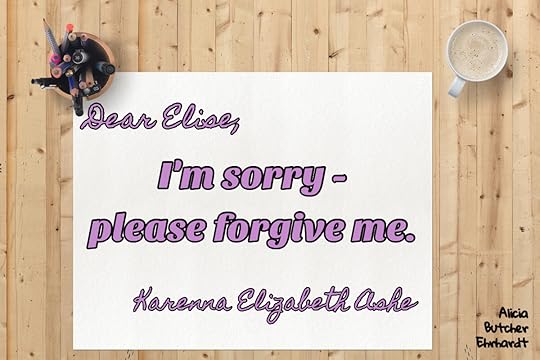 SNIPPETS (from fiction)
SNIPPETS (from fiction)From time to time, and if timely (there was an article today in the New York Times about apologies – which really aren’t very good apologies – from famous people), I’ll put out a bit from one of the Pride’s Children novels as a commentary.
The best-selling writer responds to her agent’s overstepping: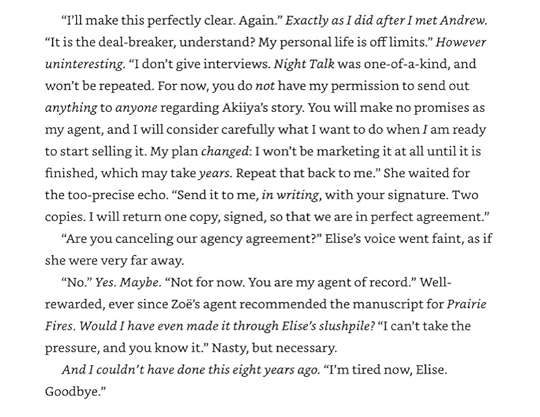 The apology – from the best-selling writer to her agent (six months later):
The apology – from the best-selling writer to her agent (six months later):
 A proper apology
A proper apologyIt has a number of features, one of which is to NOT try to evade responsibility. Another is to think of the recipient. And, literally, not to make the situation WORSE!
Kary made a choice under pressure of exhaustion, to rein in her enthusiastic agent, to set boundaries for a new type of writing (this story is SF, her previous were American historical fiction), but she’s had six months to think about it. And has higher standards for herself.
She’s also had time to prepare – extemporaneous doesn’t work well for her, as she deals with chronic illness and exhaustion (the famous people cited in the article DID have enough time…).
This snippet is from Pride’s Children: NETHERWORLD.
Have you ever had to eat your words?
**********
July 30, 2023
Who should NOT read Pride’s Children?
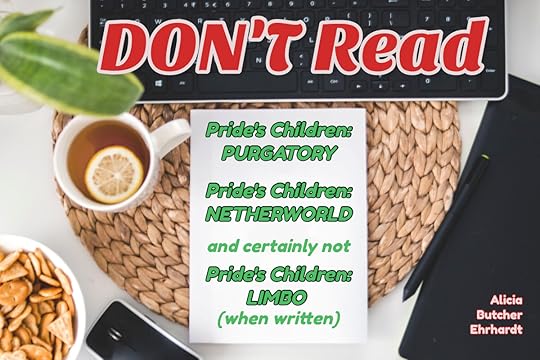 W H Y?I follow
W H Y?I follow Gill Andrews, Copywriter and Web Consultant, for her brilliant ideas about ads and websites, which she generously shares. And signed up for her newsletter, which brings me each one hot from her press.
A recent newsletter had a tip – to IDENTIFY:
“What/who is my business NOT a good place for?”
and then make sure your ad copy does NOT attract the people who will not be happy when they read it.
Gill says:
When you know who your prospects are NOT, your copy (and thus, your offers) becomes more relevant and appealing to your ideal clients.
She suggests:
Step #1: Write down at least 3 such deal-breaker characteristics of your anti-prospects.
Step #2: Think what it means for your marketing message. Are there any changes you can do to your copy today that will automatically weed out your not-so-ideal clients?
Step #1 for Pride’s Children:
Some deal-breaking characteristics of those who probably will not enjoy Pride’s Children (the first three taken from kind reviewers):
“I cannot recommend this book, this trilogy, highly enough – but not to everyone. This is a book for readers who appreciate literary fiction and a very deeply developed romance with a thoughtful debate on ethics. I believe the pace and the delayed gratification will frustrate many modern romance readers who look for fast-burning romance, titillation, and simple love stories. …” ( D. B. Rose, 5*, Great literary fiction, part one ) “To call Purgatory, the first story of a planned trilogy, different is a start. Different isn’t intended as a negative description here. But if you like your current book to feel just like the one you read before and the one you read before that, this book won’t fit that pattern. But nailing down exactly what the difference is might be difficult. It has been for me. The best explanation I’ve come up with is that the characters are more real than you’ll normally see.…” ( Big Al, 4*, Purgatory )“I love romance novels but this isn’t really one.” (Bogen/Kaminsky, 3*, Well written but so so slow and long)too longtoo slowtoo epictoo much interior monologuetoo many charactersa triangle relationshiptoo many main characterstoo much world buildingtoo big a vocabularytoo many subplotsand even, too much description of a character’s illness/disabilityStep #2 for Pride’s Children:This is the tough part.
NOWHERE in the copy I have, in the book descriptions, or in any of the interviews I have given, have I EVER called Pride’s Children a ROMANCE.
Romances have many tropes, memes, requirements, and READERS who know exactly what they want. Their covers are stylized and emblematic. I won’t list them – their readers know what they are – and I provide NONE of them. Deliberately.
But other books – mysteries, literary fiction, mainstream and commercial and upmarket fiction, SFF, and even genres such as horror or adventure – have love stories in them which may or may not be the main point of their stories. Without the majority of them being – or being marketed as – Romance.
Because life in general is full of love and love stories.
SO: I have thought hard about this part since even before publishing Pride’s Children: PURGATORY.
Because I knew it was going to be a huge problem somewhere along the line.
Here’s the kicker, though:NEITHER Goodreads nor Amazon stop READERS from labeling a book they’re reviewing as – ANYTHING THEY WANT.
Bloggers do what they choose.
And there are no Book Category Police (BCP) riding the internet on fact-finding missions to make sure labeling is accurate.
Why is this important?Because I can’t figure out how to say, “This is NOT a Romance,” without saying, “This is NOT a Romance.”
And if I SAY it, I need to do it WITHOUT ever dissing it in ANY way, because Romance is a huge and thriving genre of prolific writers and satisfied customers, and I have NO quarrel with it except their domination of our overlapping domain.
And I’m already saying it as subtly as I can manage by actually pointing out the ways in which it is not – and it isn’t working:
Romance readers read it, and provide their accurate interpretation that it fails as a Romance.Other potential readers interpret my copy to decide it’s a Romance, and don’t want to read one.My only other option?To REMOVE the love story, and I think it’s a little late for that.
**********
Suggestions welcome.
**********
July 3, 2023
Pride’s Children SALE in honor of first podcast
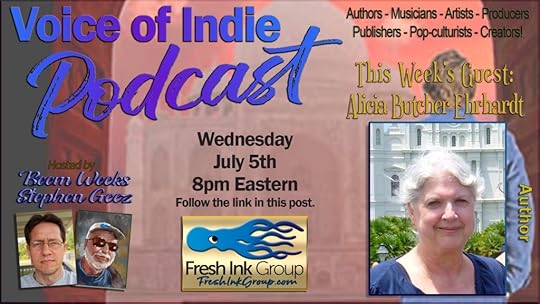 HOW DOES THE AUTHOR SOUND? WHY DOES IT MATTER?
HOW DOES THE AUTHOR SOUND? WHY DOES IT MATTER?___________
VOICE of INDIE podcast on Youtube!
Please join us or view afterward.
___________
SALE! 0.99 (local equivalent – Amazon ebooks)(Please copy/paste my name or the books’ titles into your local Amazon account – I’m still fighting to figure out universal links.)
In honor of my first podcast appearance (thanks, Beem!) which will be at 8PM EDT this Wednesday July 5th, (and my first tiny library Author talk yesterday, July 2, in Davis, CA), the EBOOKS for both Pride’s Children: PURGATORY and NETHERWORLD are 0.99USD in your local Amazon venue and equivalent price in your local currency.
This is the advantage of INDIE: without going through the Kindle Countdown Deal – which only applies in the US and UK – an indie author at Amazon can change the price ANY TIME SHE WANTS TO and CHANGE IT BACK WHENEVER SHE WANTS TO. Worldwide!
You DO need to give Amazon the time to execute this request (they say it could be up to 72 hours) enough in advance for the sale price to be effective when you need it to be, but I’ve always had the change happen fairly quickly, and don’t mind it being a longer period – I want readers much more than cash at this point.
This is why I recommend Following this blog – you find out about sales if you want to try the books yourself (or give them as presents – hint, hint) – before they’re OVER
until July 12, 2023 BOTH!
———-
Now, on to how do I sound and why does it matter?My plan, which hasn’t changed (I tend to make a decision, and stick to it if possible – so I don’t need to re-think the whole thing), has always been to do the ‘as read by the author’ version of the audiobooks for the Pride’s Children trilogy.
I had some acting training and experience in my younger days, and have always loved singing (including ten years of private voice lessons – thanks, Carol Porter!) and many years of the Princeton Folk Music Group in particular, tiny Catholic choir at the beautiful Princeton University chapel, and basically any time I could persuade or join other people.
So, indie being the UNstraightjacket it is, always included, for me, the chance to read my own books for posterity.
I know how professional Beem and Stephen and their crew are on the Voice of Indie, so I’m really looking forward to hearing MY part of the podcast for how it sounds. (Also on display will be my ability to be coherent on command, etc. – fingers crossed.)
I’m hoping the voice is holding up (time passes – things change), and I find a nice quiet recording place here at the retirement community.
When will the audiobooks happen?That’s the biggie.
Originally, I hoped to do the audio recordings as a activity after the day’s writing was finished.
Reality intervenes: on days when I get a functional chunk of time, and use it for writing, there is NOTHING left after, because I run out of steam, I’m chronically behind in the writing, and I do have a bit of a life.
And on days when I DON’T get functional time – audio is serious business – there’s no way I will produce anything I could present to the listening public.
I can’t change myself (though we’re all still waiting for the Long Covid researchers to start producing solutions for post-viral illnesses).
And there is an IMMENSE amount of learning and practicing and post-production that go along with the sheer amount of labor that goes into reading a book out loud which takes 11-12 hours minimum to read silently.
So I either have to finish and publish LIMBO first, or I would have to take a break from writing LIMBO to set up an alternating track with doing the audiobooks.
When you have no energy, either of those paths is daunting.
I constantly have to choose between doing something such as figure out Universal Links again – or staying on task and getting LIMBO done – and crave your continued indulgence. ‘May you never have to work with such a brain as mine’ is starting to be as much a Chinese curse as ‘May you live in interesting times.’
The story must always come firstOnly I can write LIMBO, and I’m already stressed by 1) knowing how long PURGATORY and NETHERWORLD took to write (15 and 7 years, respectively), and 2) growing older and always potentially sicker (and slower).
Truth is, and though I wouldn’t like it to happen, someone else can narrate the books competently (and possibly even better than I might).
And I haven’t gotten as far as I have without learning to live with my limitations AND prioritize how I spend my energy: writing LIMBO is the A1 priority.
But when opportunities like this podcast come along, and give me a chance to be recorded and/or broadcast by an external force, I take it, acquire the data, and decide LATER what to do with the information.
Because opportunities do not grow on trees and this is a huge gift. Even if I sound like a dying frog and have to be rescued at the end of every sentence by my hosts. They seem to be willing to take the risk to their actual reputation, so I will do my very best, and trust their professionalism.
The podcasts are available afterward on Youtube (professionals, as I said), and the topics are always interesting, and the VOI has a Facebook page, so join us during or after, give them your questions and feedback, and I would love to hear what you think.
**********
Remember: 0.99 sale in your equivalent currency on your local Amazon. Until 7/12/23.
Thanks for your continuing support – keep me writing!
**********
June 21, 2023
Pride’s Children IS the Great American Love Story
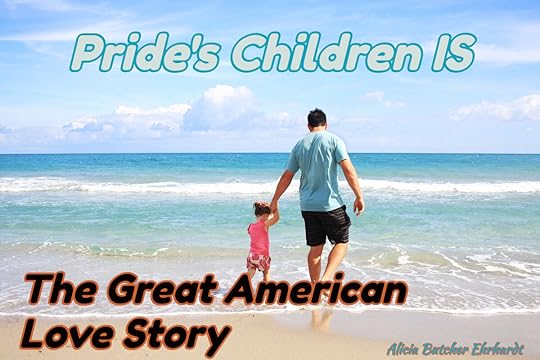 THE GREAT AMERICAN LOVE STORY MAKES YOU YEARN FOR ITS COMPLETION
THE GREAT AMERICAN LOVE STORY MAKES YOU YEARN FOR ITS COMPLETIONNow that I’ve published Pride’s Children: NETHERWORLD, and I head into LIMBO, the final stretch, where all the knots are untied, the decisions made, the impossibles attempted, the characters stand by their principles or fail them miserably, the reader finds out whether fairy tales can come true for ordinary mortals (and a few gods – note lower case), and in many ways the consequences must be paid.
I hesitated to write what had been plotted forever, twisting and turning to see if I could escape what I had planned, do it somehow better, less painfully.
And found I could not.
NETHERWORLD ended where it had to, leaving LIMBO a huge mess to deal with.
The Great American Love StoryA GALS is a huge statement, presumptuous, epic, but I want that tag line because there is something very American about about the meeting of characters from many places in the world which are unskippable steps in a story that is different from other fairytales in that it is meant to be possible.
When I’ve read, say, Elle Lothlorien’s The Frog Prince, which is in a similar category, although a Romance, and sort of a billionaire Romance between only two characters, both young and healthy and one of them a ‘royal’ type, that is a retelling of the Cinderella story, complicated by the royal being a pretender to a vacant throne, the standard circumstances separate the young potential lovers, and the story is implausible, for all its detail. A fantasy.
One foreign person has inherited his claim, the other has genuine American-type niceness as her superpower, and things proceed from there, there are no real obstacles, and… I think I read to the end, but don’t remember the ending. Not a commentary on Elle’s storytelling – she did a lovely job within the genre. I bought it – to see what the whole looked like, as she talked about it generously or was quoted on writing blogs back in the early days when I was finalizing PURGATORY, and marketing was starting to prey on my mind.
But it was ‘a contemporary fairytale’ and the plausibility was easy for me to poke holes in (that would never happen…). Feel good, feel as if the reader were the character, believe it could happen – and then go back to life as it is. Her marketing was excellent, the book did well, and her success in the Romance genre was enviable.
So I started thinking then on what could make a story fill that tagThere has to be a rocky path – Americans want obstacles overcome.
There have to be viable options; in fact, it looks as if the option first chosen was almost predetermined, and is ‘giving the masses what they want.’
Characters have to have lives of their own, full lives with work that satisfies, consumes.
The successful applicants need to make substantial changes and significant commitments, within who they are but maybe in never truly exercised depths.
It has to cost – almost too much.
It can’t be a tragedy, though it will have many elements of them. SOMETHING has to come out right in the end, though the ‘HOW’ is never foreordained. Americans don’t think Camelot or Tristan and Isolde or even Romeo and Juliet are GALS.
The reader has to care – a lot – when things seem to be going too easily to the wrong option, and there seems nothing that can be done to turn the story from the wrong tack, that it’s too late.
And it has to be earned. No shortcuts. No quick and dirty endings.
The end of Pride’s Children: NETHERWORLD is a crucibleA turning point. A place where decisions, possibly unalterable decisions, have been made.
A place where consequences display for the future in a vast list in many different directions, and the true path to any kind of happiness for our characters has more land mines than before.
A crazy place – with feathers. Where it seems all the paths might slope downhill.
Where hurt is inevitable, compromises and giving up and in the only possibilities.
A destination leaving the READER in a quandary, not knowing what to hope for.
A shock.
I remember what it felt like to reach the end of Gone With the Wind – and I also remember what a disappointment the resolution in Scarlett felt to me.
Can Pride’s Children: LIMBO complete the trilogy as a GALS?As The Great Gatsby was not.
As The Thorn Birds was not.
As West Side Story was not.
As Exodus and Love Story and Terms of Endearment were not?
I hope so.
But you will have to read to where NETHERWORLD ends – and then believe very hard in Tinker Bell.
**********
Nice to know where I’m aiming?
Wondering whether I can achieve what I want?
Wondering how I might do that?
Me, too.
I’ve had plenty of examples of what NOT to do.
Go read PURGATORY and NETHERWORLD if you have not, and prepare to yearn for a while. These things take time and have to be absolutely on.
**********
June 20, 2023
Pride’s Children is WARM Psychological Literary Fiction
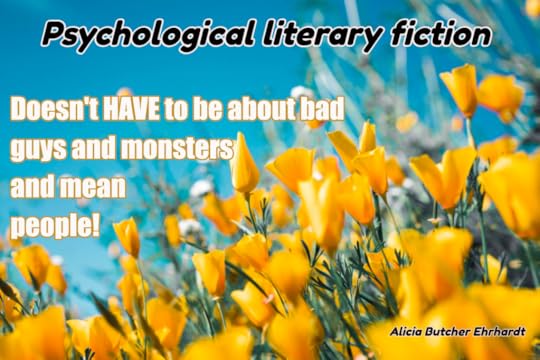 PSYCHOLOGICAL = happens on the inside of a human’s mind
PSYCHOLOGICAL = happens on the inside of a human’s mindThough into every life some of those people must fall!
I was checking through the pages for both Pride’s Children novels (so far), PURGATORY and NETHERWORLD, on their Amazon pages, and found the following earlier today:
Pride’s Children: PURGATORY – #753 in Psychological Literary Fiction
Pride’s Children: NETHERWORLD – #660 in Psychological Literary Fiction
It made me think, because I set up that particular category with the following comment from reviewer David Rose in mind:
The LITERARY FICTION, psychological, subcategory was coopted by the dark guys“…I cannot recommend this book, this trilogy, highly enough – but not to everyone. This is a book for readers who appreciate literary fiction and a very deeply developed romance with a thoughtful debate on ethics. I believe the pace and the delayed gratification will frustrate many modern romance readers who look for fast-burning romance, titillation, and simple love stories. However, if you are a reader who will appreciate a modern ‘Jane Eyre’, this trilogy is for you…”
D. Rose, PURGATORY review (used by permission)
We don’t need ‘psychological’ to represent negative human emotions only; we already have thrillers and ‘noir’ and ‘twisted’ and some really gory stuff.
The category, on Amazon as I just checked, was full of a slew of a majority of novels which would take you to a deep hole with little redemption even mentioned.
Plus a smattering of dark-ish stuff that doesn’t fit other categories, including disturbing works by many authors such as Jodi Picoult, and Crime and Punishment by Dostoyevsky.
Literary fiction is already by definition interested in more than the obvious, but where I see a possibility for exploring, and learning, and changing, many of these books have already made up their minds: it’s a dark and scary place out there, BEWARE!
I’d like to allow for the full spectrum of human behaviorHumans make decisions for all kinds of reasons, change their minds, deal with consequences, make DIFFERENT choices, and have to correct course even when it’s hard.
In a category of books for sale, the balance is currently lopsided (which is cute in rabbit ears, less so in human behavior).
Positive, not forced or applied from outside, but because writers don’t only choose the knotty problems (or aren’t only rewarded for showing the grotty side of life), but because there is a core of resonance in most humans for the rewarding, good, meaningful experiences, even when they are not easy to acquire.
That’s what I’m interested in exploring through the characters in Pride’s Children – because Pride can be a deadly sin – or a warm human emotion.
Coming with me?
**********
June 11, 2023
A relevant little story about copyrighting titles
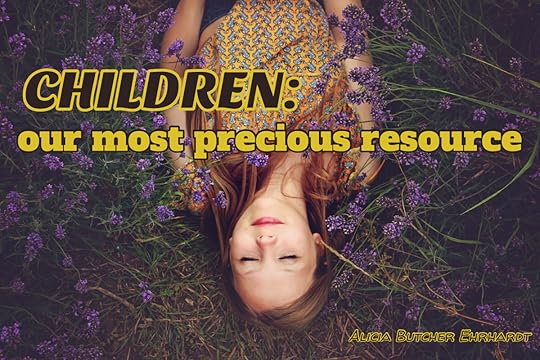 SERENDIPITY – FOR THE ACCIDENTAL WIN
SERENDIPITY – FOR THE ACCIDENTAL WINThis being Pride Month, I thought I’d share a little story.
I picked my trilogy title – PRIDE’S CHILDREN, some years before I published the first book in the trilogy, Pride’s Children: PURGATORY, in late 2015, after several other possibilities.
My title referred, among other things, to the sin of hubris, the pride in having children and what we do for it, and even to the concept of a pride of lions – and cubs – which worked well for the themes in the books. Many things came together and snapped into place – and I locked it in, thought about how to illustrate and use it, and looked up biblical quotations which had relevance (and which I’ve used as chapter epigraphs and/or titles in both volumes so far).
It took me so long to finish WRITING it that when I went to publish, another book had been published with that TITLE – and I was nonplussed for a little while because I might have already even done a cover reveal of Pride’s Children: PURGATORY by then.
And my investigations showed that, no matter how precious or unique, TITLES cannot be copyrighted, per se.
But then I thought about itAnd realized that I was perfectly happy to SHARE. So it wasn’t a race to the finish against other authors, but a way to preserve things like titles so that everyone could use them.
And, of course, that readers are smart, and can handle this, and might even be amused or touched (for example, there are a whole lot of titles that include ‘Children of Pride’ in them – from biblical and religious subjects through families named ‘Pride’ and into gay titles) without, I hope, the similarity being a problem for any of us except maybe some extreme right wing Evangelicals who forget Who made us all (and for whom I pray they be enlightened).
I just checked, and THAT BOOK is still available on Amazon (though Konnor doesn’t seem to have written other books).
That book is Pride’s Children
I also realized it has long been time for ALL of us to take a standPrivately, for most of us; publicly now whenever NOT saying something indicates to the wrong people that we AGREE with the prejudice that is being shown throughout our nation and the world that gives ANY of us the right to condemn another human being for who they were born and have no control over, or how they choose to worship (or not).
This is mine: Happy Pride Month!
I believe MY readers will be firmly in my camp – you don’t read my kind of fiction, from a very LIBERAL DEMOCRATIC CATHOLIC WOMAN writer if you are not.
Even Bianca I believe would agree – if you’ve read, you’ll know why.
**********



